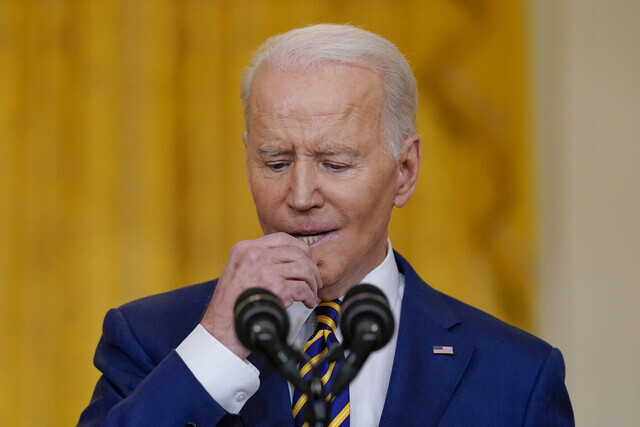hankyoreh
Links to other country sites 다른 나라 사이트 링크
All eyes on Biden’s response to N. Korea’s ICBM, nuclear weapons comments

North Korea has thrown down the gauntlet to US President Joe Biden by announcing it will consider resuming tests of nuclear weapons and intercontinental ballistic missiles, which it suspended back in 2018. This represents a serious challenge for the US’ policy on North Korea since Biden has claimed a commitment to dialogue without having initiated meaningful talks with the North.
Pyongyang announced Thursday that it’s considering lifting the moratorium on nuclear and ICBM tests it has maintained since 2018 in remarks directly aimed at the US. The announcement came in reports in state-run media such as the Korean Central News Agency.
The Politburo of the Central Committee of the Workers’ Party of Korea made clear Wednesday that the decision came in response to what they called the Biden administration’s “policy of hostility” toward Pyongyang.
“The hostile policy and military threat by the US have reached a danger line that cannot be overlooked anymore,” the Politburo reportedly said in a decision that was deliberately scheduled to coincide with the first anniversary of Biden’s inauguration.
Depending on how both sides handle the situation going forward, this announcement could set the Korean Peninsula back on the path to the “fire and fury” era of 2017. If North Korea ends its moratorium on nuclear tests and ICBM test launches, the US will have no choice but to respond accordingly.
However, it seems unlikely that this announcement is enough to prompt the US to drastically ratchet up its response. After all, Pyongyang hasn’t actually resumed testing nuclear weapons and ICBMs, but only said it will “review” the idea. US Secretary of State Antony Blinken’s remark that North Korea is “trying to get attention” with its recent missile launches reinforces predictions that the US isn’t about to push the panic button.
Furthermore, with US foreign policy currently focused on Ukraine and Russia, there’s little room for a sudden shift to either full-on confrontation or complete concessions in its relations with North Korea.
In fact, Biden didn’t mention North Korea during a press conference Wednesday, on the first anniversary of his inauguration, nor did reporters ask any questions about it. Aside from concerns over a potential Russian invasion of Ukraine, the news conference focused on domestic issues such as inflation, the COVID-19 pandemic, social spending and climate change legislation.
That’s why it’s reasonable to expect that the US will stick to a prudent stance of calling for dialogue while condemning actions by the North that escalate tensions.
The problem is that North Korea is likely to ramp up its behavior under the pretext of its five-year plan for developing defense science and weapons systems, which it announced last January. That plan includes super-large nuclear warheads, hypersonic missiles and solid-fuel ICBMs.
“The greater North Korea’s weapons capabilities, the greater its leverage in dialogue with the US. North Korea will crank up its testing offensive with ICBMs or tactical nuclear weapons following the Beijing Olympics in February and the South Korean presidential election in March,” said Sue Mi Terry, head of Korean history and public policy at the Wilson Center, an American think tank, in an interview with the Hankyoreh.
Such behavior would cross a “red line” that would be hard for the US to ignore, forcing it to contemplate suitable countermeasures. To interrupt that vicious cycle, South Korean President Moon Jae-in is left with no choice but to focus on communicating with the US and coordinating policy in his final weeks in office.
By Hwang Joon-bum, Washington correspondent
Please direct questions or comments to [english@hani.co.kr]

Editorial・opinion
![[Editorial] Penalties for airing allegations against Korea’s first lady endanger free press [Editorial] Penalties for airing allegations against Korea’s first lady endanger free press](https://flexible.img.hani.co.kr/flexible/normal/500/300/imgdb/original/2024/0502/1817146398095106.jpg) [Editorial] Penalties for airing allegations against Korea’s first lady endanger free press
[Editorial] Penalties for airing allegations against Korea’s first lady endanger free press![[Editorial] Yoon must halt procurement of SM-3 interceptor missiles [Editorial] Yoon must halt procurement of SM-3 interceptor missiles](https://flexible.img.hani.co.kr/flexible/normal/500/300/imgdb/child/2024/0501/17145495551605_1717145495195344.jpg) [Editorial] Yoon must halt procurement of SM-3 interceptor missiles
[Editorial] Yoon must halt procurement of SM-3 interceptor missiles- [Guest essay] Maybe Korea’s rapid population decline is an opportunity, not a crisis
- [Column] Can Yoon steer diplomacy with Russia, China back on track?
- [Column] Season 2 of special prosecutor probe may be coming to Korea soon
- [Column] Park Geun-hye déjà vu in Yoon Suk-yeol
- [Editorial] New weight of N. Korea’s nuclear threats makes dialogue all the more urgent
- [Guest essay] The real reason Korea’s new right wants to dub Rhee a founding father
- [Column] ‘Choson’: Is it time we start referring to N. Korea in its own terms?
- [Editorial] Japan’s rewriting of history with Korea has gone too far
Most viewed articles
- 160% of young Koreans see no need to have kids after marriage
- 2Presidential office warns of veto in response to opposition passing special counsel probe act
- 3[Editorial] Penalties for airing allegations against Korea’s first lady endanger free press
- 4[Editorial] Japan’s rewriting of history with Korea has gone too far
- 5Japan says it’s not pressuring Naver to sell Line, but Korean insiders say otherwise
- 6For survivor, Jeju April 3 massacre is a living reality, not dead history
- 7[Column] Park Geun-hye déjà vu in Yoon Suk-yeol
- 8Months and months of overdue wages are pushing migrant workers in Korea into debt
- 9[Guest essay] Maybe Korea’s rapid population decline is an opportunity, not a crisis
- 10Hybe-Ador dispute shines light on pervasive issues behind K-pop’s tidy facade